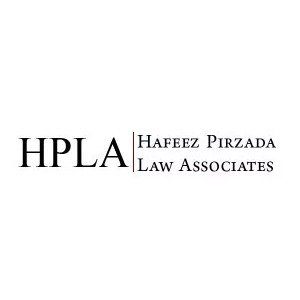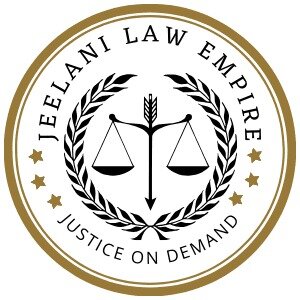Best Water Law Lawyers in Karachi
Share your needs with us, get contacted by law firms.
Free. Takes 2 min.
List of the best lawyers in Karachi, Pakistan
About Water Law in Karachi, Pakistan
Water Law in Karachi, Pakistan, refers to the body of laws, policies, and regulations that control the allocation, use, management, and protection of water resources in the region. The field encompasses a wide spectrum of issues, including water rights, distribution, pollution control, supply and sanitation, groundwater extraction, and the responsibilities of government bodies overseeing water resource management. Karachi, being Pakistan's largest city and a coastal metropolis, faces complex challenges in water provision and sustainability, making Water Law crucial to both daily life and the long-term development of the city.
Why You May Need a Lawyer
Situations involving Water Law can be legally intricate and may have significant personal, commercial, or environmental impacts. You may require legal help in the following scenarios:
- Disputes over water supply and connection rights with public utilities or private suppliers
- Allegations of unauthorized extraction of groundwater
- Conflicts relating to water pollution or contamination affecting residential or commercial property
- Licensing and regulation issues for industrial, agricultural, or real estate developments needing large amounts of water
- Non-compliance notices from regulatory bodies such as water boards or environmental authorities
- Negotiating or contesting water pricing, billing, and penalties
- Matters concerning water conservation, rainwater harvesting, or waste water treatment
- Litigation arising from environmental degradation or water resource mismanagement
An experienced lawyer can help navigate the complex regulatory landscape, ensure compliance, protect your rights, and represent you in legal proceedings.
Local Laws Overview
Karachi’s Water Law landscape is influenced by a combination of federal, provincial, and local legislation as well as executive regulations. The following local laws and frameworks are especially relevant:
- Karachi Water and Sewerage Board (KW&SB) Act governs the city's main water authority and its powers over water distribution, supply, and sanitation.
- Sindh Environmental Protection Act 2014 regulates pollution and sets standards for water quality, with the Sindh Environmental Protection Agency (SEPA) overseeing enforcement.
- Water and Power Development Authority (WAPDA) laws impact bulk water resources and their allocation downstream.
- Groundwater Regulation covers the licensing and control of borewells and tube wells to prevent over-extraction and ensure equitable distribution.
- Municipal and Local Government By-laws may regulate tanker services, water charges, and supply timelines within city limits.
- Building Codes include provisions related to water connection, plumbing standards, and sewage disposal for residential and commercial buildings.
Failure to comply with these laws can result in penalties, disconnection, or even criminal liability in case of willful contamination or theft of water resources.
Frequently Asked Questions
What is the main authority responsible for water supply in Karachi?
The Karachi Water and Sewerage Board (KW&SB) is the primary body managing the water supply, distribution, and sanitation services in Karachi.
Is it legal to dig a private borewell for water in Karachi?
Drilling a private borewell typically requires prior approval or a license from relevant authorities, as regulated by local and provincial laws to prevent groundwater depletion.
What should I do if my water supply is disconnected without notice?
Contact the water utility for clarification and check if there are outstanding bills, maintenance issues, or violations. If improperly disconnected, you can file a formal complaint and, if necessary, seek legal remedy.
Are there penalties for illegal water connections?
Yes, unauthorized water connections can lead to fines, prosecution, and immediate disconnection by the KW&SB or other authorities.
How can I challenge incorrect water billing or excessive charges?
You can file a written complaint with the water board or relevant authority. If unresolved, a lawyer can assist you in escalating the dispute or taking legal action.
Who is responsible for sewage and wastewater management?
The KW&SB is also responsible for sewage and wastewater management. Environmental complaints can also be addressed to SEPA.
Can residents take legal action for water contamination?
Yes, affected persons can file complaints with SEPA, take up the matter with municipal authorities, or seek legal action for compensation and rectification.
Are there laws regulating water pollution by industries?
Yes, industries must adhere to discharge standards set by SEPA and other environmental regulations. Violations can lead to fines, closures, or criminal prosecution.
What legal steps can be taken against water tanker mafias or supply manipulation?
You may complain to the police, local government, or KW&SB. Legal assistance can help in escalating such matters to court or regulatory bodies.
What role does the Sindh Environmental Protection Agency play in Water Law?
SEPA enforces environmental safeguards, water quality standards, and compliance by individuals and industries. It also addresses complaints relating to water pollution and wastage.
Additional Resources
Those seeking more information or support related to Water Law in Karachi can approach the following bodies and organizations:
- Karachi Water and Sewerage Board (KW&SB) for supply, connection, billing, and disputes
- Sindh Environmental Protection Agency (SEPA) for environmental regulation and pollution complaints
- Sindh Irrigation Department for bulk water resource allocation and irrigation matters
- Local Government Offices for municipal by-law concerns, local disputes, and community initiatives
- Non-Governmental Organizations such as the Pakistan Council of Research in Water Resources, which offers advocacy and education
- Legal Aid Societies for guidance and pro bono legal assistance in environmental and civil cases
Next Steps
If you believe you need legal assistance regarding Water Law in Karachi, take the following steps:
- Document your issue, including any correspondence, photographs, notices, and bills
- Reach out to the relevant authority or regulatory body for clarification or initial resolution
- If the problem persists, consult a lawyer specializing in environmental or utility law
- Present all relevant information to your lawyer for a clear understanding of your case
- Follow legal advice carefully and comply with all lawful requirements
- Consider mediation or alternative dispute resolution if advised by your legal counsel
Taking timely action and seeking professional guidance can help address your concerns effectively and protect your legal rights under Water Law in Karachi, Pakistan.
Lawzana helps you find the best lawyers and law firms in Karachi through a curated and pre-screened list of qualified legal professionals. Our platform offers rankings and detailed profiles of attorneys and law firms, allowing you to compare based on practice areas, including Water Law, experience, and client feedback.
Each profile includes a description of the firm's areas of practice, client reviews, team members and partners, year of establishment, spoken languages, office locations, contact information, social media presence, and any published articles or resources. Most firms on our platform speak English and are experienced in both local and international legal matters.
Get a quote from top-rated law firms in Karachi, Pakistan — quickly, securely, and without unnecessary hassle.
Disclaimer:
The information provided on this page is for general informational purposes only and does not constitute legal advice. While we strive to ensure the accuracy and relevance of the content, legal information may change over time, and interpretations of the law can vary. You should always consult with a qualified legal professional for advice specific to your situation.
We disclaim all liability for actions taken or not taken based on the content of this page. If you believe any information is incorrect or outdated, please contact us, and we will review and update it where appropriate.

















